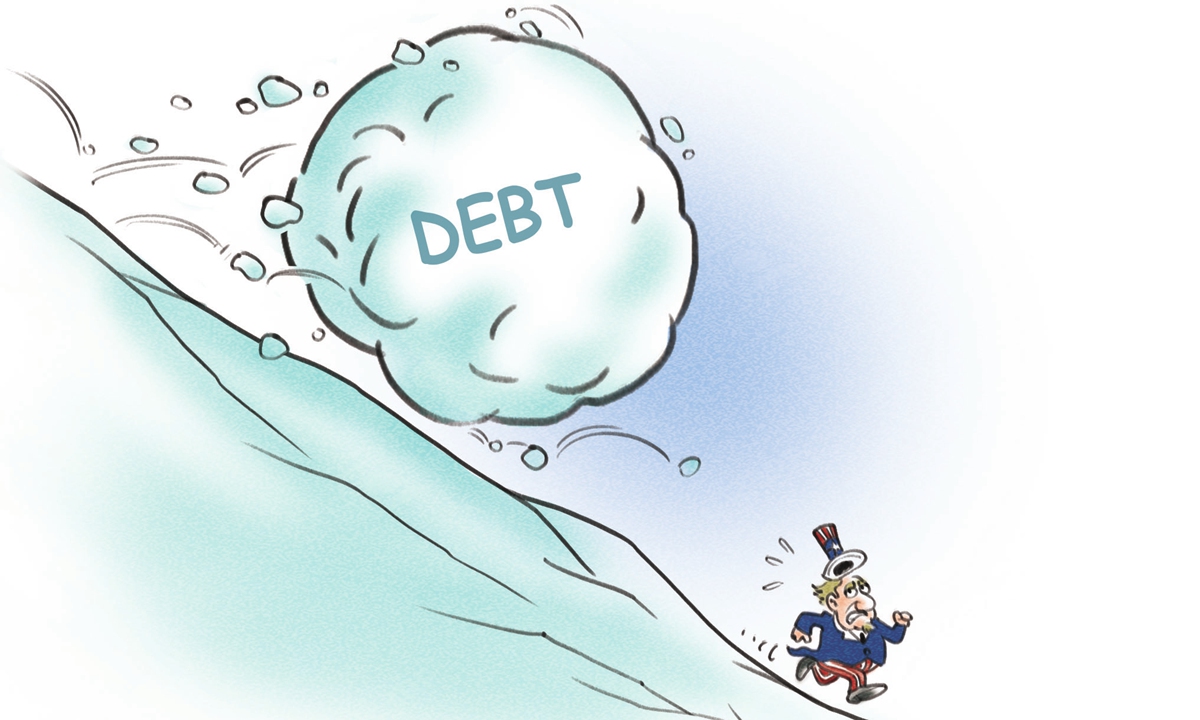Is US a ‘financial zombie’ going bankrupt?
By Wang Wen Source: Global Times Published: 2020/10/12 17:32:03

Illustration: Liu Rui/GT
In an essay co-published by my colleagues and me in the latest edition of the renowned Chinese journal Contemporary International Relations, we revealed our findings that the US is becoming a "financial zombie."
If we took the US as a company, it would be on the verge of bankruptcy due to its long-term chaotic governance and high debt. It now appears that the national image of the US has almost gone bankrupt. The trend of "de-dollarization" has also taken shape. The main difference, though, is that the US is a sovereign country, supported by its imperial system.
From the perspective of economic governance, the US government is very similar to a corporation. In this system, the US federal government is equivalent to the management; the Congress is the board of directors; and the US president is similar to a CEO elected once every four years. In addition, every US citizen can be regarded as a minority shareholder holding "American equity." The US election is actually more like a company holding a general meeting of shareholders.
In terms of corporate finance, the US government has become "insolvent." It has to rely on loans and deficits to maintain operations. In the field of corporate governance, this is usually called a "zombie enterprise." In this sense, the US is allowing for a term to be coined: the "nationally financial zombie."
Australian economist John Quiggin first put forward the concept of "Zombie Economics," which means that the economy of most capitalist countries is facing the situation from heavy housing loans to mounting credit card bills; from expensive luxury list to health care bills; and huge personal financial pressure roaring like zombies, which drag the country into the mire of "Zombie Economics."
When the national fiscal policy cannot support the existence of "Zombie Economics," the phenomenon of a "financial zombie" will follow.
Since the outbreak of the COVID-19 pandemic in 2020, the US government has issued a series of fiscal and monetary stimulus policies to support economic recovery. The US Federal Reserve has also rapidly lowered benchmark interest rates to historically low levels of zero to 0.25 percent, launched unlimited monetary easing policies, and purchased a large number of various bonds.
The size of the US Federal Reserve's balance sheet has rapidly increased from nearly $4 trillion to more than $7 trillion in one year. The scale of US national public debt has also increased from $23.2 trillion at the end of 2019 to over $27 trillion in October 2020. It is expected to be close to $30 trillion by the end of 2021.
In just half a year, the Fed's balance sheet has increased by $2.89 trillion, an increase of nearly 70 percent - making it almost catch up with the total of the balance sheet growth between 2008 and 2014. The terrible economic situation has gradually plunged the US into an endless loop of "deficits." And now its fiscal and monetary policies are in a passive state of deficit spending.
Although huge increases in the US dollar supply temporarily alleviated liquidity crises in the financial markets, it also made a US asset bubble that should have been settled to re-expand rapidly. In the long run, this is just a hard time delay. It will eventually lead to a bubble in the US financial markets, with worsening results.
According to data compiled by Deutsche Bank Securities, nearly one in every five publicly traded US companies is a "zombie," this is double the amount compared with figures in 2013. The Fed's continued monetary policy support only serves to prolong the survival of American companies that should have gone bankrupt.
Under the impact of the financial crisis in 2008 and the COVID-19 pandemic in 2020, the so-called myths of US styled democracy, wealth, and values are shattering. Over the years, with the continuous expansion of the fiscal deficit and the rapid accumulation of the size of American debt, it can be argued that the US is accelerating its own national bankruptcy.
It is not certain whether the US is bound to go bankrupt. But it can at least be said that the rapid fall of the US into the abyss of "financial zombification" under the COVID-19 pandemic is well underway. One can see that major changes in the relationship between capital and technology are at a major "historical crossroad."
The author is professor and executive dean of Chongyang Institute for Financial Studies at Renmin University of China. opinion@globaltimes.com.cn
RELATED ARTICLES:
Posted in: COLUMNISTS,VIEWPOINT